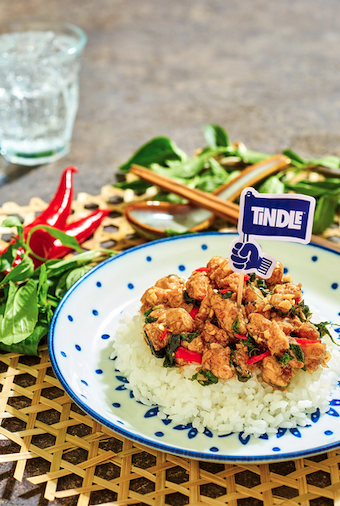Food tech serial entrepreneur Matilda Ho is the founder and managing director of Shanghai-based Bits x Bites, a company that invests in startups working to help feed China’s growing population of 1.4 billion people in a more sustainable way.
We first caught up with Matilda back in 2017 when Bits x Bites was just starting out, and since then, it has added 15 portfolio companies. The company is currently investing in everything from precision agriculture to alternative protein solutions to plant-based education options.

READ MORE: Meet Matilda Ho, the Food Disruptor Changing Tastes in China
But we particularly wanted to learn more about Yimishiji, Matilda’s eGrocery platform that services the Shanghai market, so we tracked down this impact investor to learn more about both how the space has evolved over the last half a decade and what this all means on a local and nation-wide level.
READ MORE: Shanghai Entrepreneurs: Matilda Ho
Briefly describe Bits x Bites – what it does and how it has evolved.
Bits x Bites is a venture capital fund that invests in early-stage agrifood tech startups tackling systemic challenges in the food system. We are one of the very first in Asia to invest in this space and the first Chinese VC to invest in cellular agriculture, when we backed Israeli company Future Meat Technologies in 2018.
Since then, our most recent investments have been in Next Gen, which has introduced a plant-based chicken product named TiNDLE.

Image courtesy of TiNDLE by Next Gen
Tell us about Yimishiji eGrocery platform and how it services the Shanghai market.
I founded Yimishiji as an online farmers’ market to bring natural and organic produce to families. We designed it to be a farm-to-table D2C platform that empowers consumers to eat safer, better, healthier and more mindfully.
Most of our customers are parents concerned about safe, clean, traceable and healthy eating for their family. The others are Gen Z customers looking for food products that speak to their curiosity and value standards. These customers are drawn to our platform because of our safety standards, such as zero chemical residues, zero antibiotics and minimal additives. We carefully source fresh produce and also develop a wide range of healthy private-label products that meet such criteria. Our private-label products have grown to nearly 500 items today.

Image courtesy of Yimishiji
What are some of the alternative protein solutions your company focuses on?
At Yimishiji, we have very stringent product selection requirements for all of our offerings: no chemical residues in our produce, no antibiotics in our meat, no artificial flavoring in our packaged products, just to name a few examples. And, of course, they have to taste great and offer good value to our customers.
We are equally picky with our plant-based offerings. Our team has sampled several dozens of protein alternative products on the market and are happy that we finally found a small number of products that have convinced our merchandising team. Now, we offer 16 plant-based beverages and yogurts made of almond, mung bean and/or walnuts. We have also introduced our own high-protein meatless snacks.
How do you see these alternative protein solutions changing the scope of agriculture in China for the better?
The Chinese diet has traditionally consisted of a wide diversity of plant sources. We have established supply chains for many of these plant ingredients. It gives China an opportunity to play a bigger part as a supplier of high-value ingredients as these plants become the foundation of new-generation protein products.
Take mung beans and yellow peas as examples. In addition to dried mung beans or selling bean sprouts, mung beans are now used as the base protein ingredient in plant-based eggs. Previously, pea was separated into starches that went into vermicelli noodles and protein powder as animal feed. Now, pea provides the core protein in many plant-based products such as Beyond Meat.
Looking ahead, there is also potential to develop breeding innovations to genetically engineer plants to produce specific proteins used for animal alternatives, such as casein in milk. We’re just scratching the surface.
Which plant-based protein companies are you currently working with that you feel are the most promising for entering and making an impact in the Chinese market?
In all of Bits x Bites investments, we evaluate the companies based on their potential relevance for the Chinese market.
On the ingredient side, we have invested in a chickpea protein concentrate company. Chickpea is neutral in color and taste, which makes it versatile in both meat and dairy applications. Also, chickpea can grow with very little water and is therefore perfect for cultivating in areas like northern China. In 2020, Xinjiang has allocated 13,000 mu in the Toli area for growing chickpeas.
Elsewhere, we have invested in Future Meat Technologies, an Israeli cellular agriculture company that has developed cell-based chicken fat that can fill in the aroma, taste and texture missing in many plant-based products. The first product will be a cell and plant hybrid product that can closely mimic chicken meat.
Next Gen, our newest investment, is a Singaporean company that makes TiNDLE, plant-based chicken thigh. Its texture and versatility make it extremely well suited for Chinese cuisines. The product is now in Hong Kong, Macau and will soon be in the US, followed by major cities in China.
Are there specific regions of China you focus your energy on?
For innovative food companies, we believe Shanghai is a great base. On one hand, it has a large and diverse customer base who is as conscious about health and nutrition as it is curious about new products and flavors. On the other, it has a vibrant dining scene and community that is keen to experiment with new menu and ingredient options. Shanghai also has a strong network of food and ingredient R&D resources that are keen to learn about what startups have to offer and to collaborate. This makes it a great springboard for companies to introduce themselves in the Chinese market.
Of course, given our investment scope across the full supply chain, we frequently go to key agricultural regions like Shandong and agrifood tech academic and research hubs like Zhejiang and Beijing.
What are major challenges you faced that you didn’t anticipate in the last few years relating to Yimishiji eGrocery platform and Bits x Bites?
Lots. Take COVID as an example. On the Yimi side, the pandemic has accelerated e-commerce adoption, which led to a growth that was much faster than expected. At the same time, it highlighted a lot of supply chain challenges such as logistic costs, which we have had to adapt to.
On the Bits x Bites side, COVID caused severe disruption to food imports in many categories. And when it coupled with African Swine Flu and the trade war, food security and self-sufficiency in food production rose in the central government’s agenda. When business as usual is not an option, it opens a great window for entrepreneurs to apply technological solutions to boost agrifood production efficiency. During this time, we invested in agricultural drone company EAVision and bio manufacturer of nutrients Mojia Bio.

Image courtesy of InnovoPro
Over the last four years, have your companies grown as you predicted they would, or did they take an alternative approach to sustainability and helping solve food system challenges?
All our investments are made in companies that combine purpose and profit. Over the last three years, we have doubled down our investment in several portfolio companies that have reached or surpassed their technology and commercial milestones. Some examples are Tropic Biosciences, a CRISPR gene editing company tackling coffee and banana; InnovoPro, chickpea protein concentrate company; Future Meat Technologies, cell-based chicken fat company soon to introduce a hybrid chicken product; and Alchemy Foodtech, a company developing a low-GI version of Asian carbohydrate staples with no taste compromise.
What do you predict will be the biggest challenges in the next five years, and how do you aim to push past those challenges?
Carbon neutrality has been named a top priority across key Chinese institutions. Given the scale of China’s agrifood industry in China, needless to say, there is tremendous potential to reduce the carbon footprint of our food supply chain. As an investor, Bits x Bites will continue to identify and invest in transformative technology that can move chemically synthesized ingredients and agricultural inputs to bio-based products, precision agriculture and crop models that enable more efficient use of agricultural inputs, and of course, diverse protein sources to reduce resource-intensive animal agriculture.
To learn more about Bits x Bites, click here.
To learn more about Yimishiji, click here.





















0 User Comments